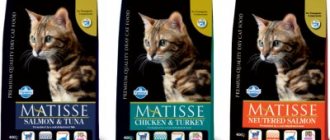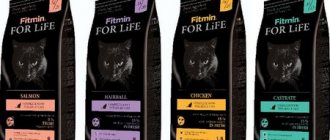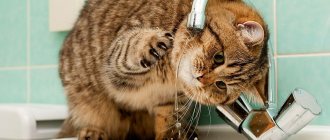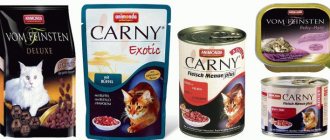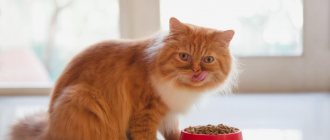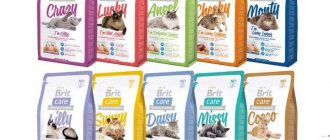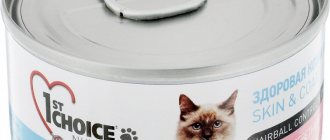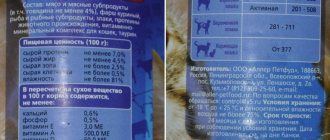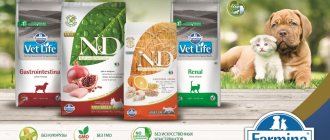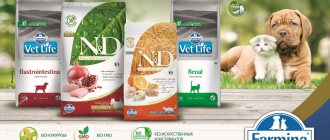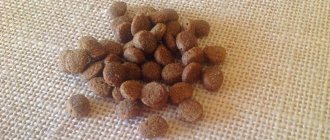To understand which manufacturers of ready-made food can be trusted and which cannot, cat owners will have to work hard. However, no one died from such a load: all you need to do is study the information about the line you like, ask how the food is prepared, and delve into the ingredients. Then it will become clear whether such food is suitable for your pet or not. Vet Life cat food scores high in the popular food ratings - let's take a closer look at them.
Manufacturer
The Italian company Farmina Pet Food is the manufacturer of Vet Life. The story dates back to the middle of the 19th century, when a certain Francesco Russo, having a desire to create feed for farm animals, created Russo Feed.
Initially, it was purely home production: Rousseau involved his own household members in the work, therefore the volumes of the product produced were small and not suitable for a large market. But gradually, becoming convinced that expansion was necessary, one of Francesco’s sons, Angelo, invited the English company Farmina to work (it specialized in the production of food for dogs and cats). The cooperation soon bore fruit: new innovative products and new brands were born.
Over time, partnerships were established with the Neapolitan Department of Animal Nutrition at the Federico II Research University; An independent research department was created, which included several specialists in the field of nutrition and veterinary medicine.
Now, in addition to Italy, there are feed production factories in Brazil and Serbia.
Only natural raw materials from trusted partners are used in production. These raw materials, according to the rules, are suitable for human nutrition, but are not intended for food for commercial reasons. The production technology includes a twin-screw extruder (which increases the digestibility of the product) and a system for adding ingredients in a vacuum (this preserves a maximum of vitamins and minerals).
Strict control is carried out at all stages of production, from the moment of purchasing raw materials to the release of finished feed.
Farmina Vetlife cat food
Vet Life (“Vetlife”) is a veterinary line of food from the Farmina brand (“Farmina”). These feeds are produced in Serbia (Indjia), Italy (Nola) and Brazil (Braganca Paulista). Vetlife food was developed by Farmina scientists and scientists from the University of Naples (Department of Veterinary Nutrition). The manufacturers of these foods claim that products with a low glycemic index and do not contain GMOs contribute to the recovery of cats and dogs from various diseases.
The history of Farmina brand food began in 1965. Then a company called “Russo Feed” was created, and its founder was Francesco Russo. In 1999, Angelo Russo (son of the founder) came to the company, and he decided to develop the company to an international level. Angelo facilitated the merger of his production and the English organization Farmina Pet Foods. So a small food production plant began producing dry pet food.
In addition to Vet Life, Farmina also produces other lines of food:
- Natural Delicious (“Natural Delicious”) - holistic food with low or no grain content;
- Fun Dog (“Fan Dog”) and Fun Cat (“Fan Cat”) - budget food for dogs and cats;
- Cibau ("Chibau") and Cimiao ("Chimau") - super premium hypoallergenic food for cats and dogs;
- Mattise is a premium cat food with a high content of vitamins.
The production of feed is carried out to order from distributors, which ensures the receipt of a fresh product (there are no stocks prepared in advance)
Range
Both dry food and canned food are produced for sale.
Vet Life Hairball is designed to remove hairballs from the stomach of an adult. Ingredients: chicken meat and fat, peas, dehydrated fish, herbs, vegetables, fructooligosaccharides, mannooligosaccharides, brewer's yeast.
Vet Life Neutered Female and Vet Life feline are suitable for sterilized and neutered cats. The ingredients include soybean extract, sugar beet pulp, and whole dehydrated eggs.
Vet Life feline is an option for weakened cats, for those with a weak stomach. This is a dietary food that can be given to cats for inflammatory diseases of the gastrointestinal tract. Contains: fish protein (hydrosylate) and fish oil, calendula extract, rice starch, calcium carbonate, fructooligosaccharides, potassium chloride.
Vet Life Diabetic is the best option for diabetics. Chicken fillet, spelled, oats, fish, eggs, animal fat, pork.
Vet Life Obesity will help your cat lose those extra pounds. The composition is nutritious, but will not allow you to gain fat.
Vet Life Renal and Vet Life Cardiac are approved for use in chronic heart failure to support renal function in renal failure. There is little sodium in the composition, some phosphorus, and a limited amount of protein. Added mannose oligosaccharides based on Saccharomyces cerevisiae extract.
Vet Life Struvite Management is recommended by veterinarians for urolithiasis and cystitis. Added DL-methionine and ammonium chloride.
Vet Life Struvite helps dissolve struvite uroliths. Added calcium sulfate dihydrate and DL-methionine.
Vet Life Gastrointestinal and Vet Life Hepatic are prescribed for chronic kidney failure and stomach problems. It contains easily digestible carbohydrates, a lot of polyunsaturated fatty acids and a dosed amount of protein.
There are also canned goods:
Vet Life Renal - to support kidney function.
Vet Life Struvite - prevention of struvite urolithiasis.
Vet Life Gastrointestinal is a dietary option for individuals who have problems digesting food pieces and absorbing nutrients. There are a lot of electrolytes here.
Vet Life Convalescence - for cats who have suffered a serious illness and require special nutrition.
Comparison of Vet Life line feeds
Vetlife veterinary food is available in packs of 400 g, bags of 2 kg and bags of 10 kg. Crickets are available in chicken (poultry), fish or pork flavors. Rice or cereals are included as side dishes.
Table: comparison of Vetlife feeds
| Name | Main cast | Guaranteed performance | Energy value | Price (400 g) | |||||
| Protein | Crude fat | Cellulose | Raw ash | Calcium | Phosphorus | ||||
| Hairball |
| 34,0% | 15,0% | 8,0% | 7,60% | 1,15% | 0,95% | 3495 kcal (14.6 MJ/kg) | From 315 rubles |
| Diabetic |
| 46,0% | 13,0% | 4,60% | 7,90% | 1,20% | 0,98% | 3503 kcal (14.7 MJ/kg) | From 385 rubles |
| Gastrointestinal (“Gastrointestinal”) |
| 33,0% | 21,50% | 1,70% | 7,30% | 1,0% | 0,90% | 4050kcal (17 MJ/kg) | From 410 rubles |
| Neutered Male |
| 37,0% | 10,0% | 6,50% | 7,80% | 1,20% | 1,10% | 3290 kcal (13.8 MJ/kg) | From 320 rubles |
| Neutered Female |
| 33,0% | 6,40% | 7,60% | 1,0% | 0,90% | 3300 kcal (13.8 MJ/kg) | ||
| Obesity |
| 43,0% | 9,0% | 10,0% | 7,50% | 1,10% | 0,95% | 3128 kcal (13.1 MJ/kg) | From 380 rubles |
| Renal ("Renal") |
| 24,5% | 20% | 0,90% | 5,30% | 0,60% | 0,40% | 4073 kcal (17.1 MJ/kg) | From 404 rubles |
| Struvite |
| 34,0% | 16,0% | 1,20% | 5,90% | 0,80% | 0,60% | 3842 kcal (16.0 MJ/kg) | From 370 rubles |
| Struvite Management |
| 33,0% | 16,50% | 6,60% | 0,85% | 0,70% | 3842 kcal (16.1 MJ/kg) | ||
| UltraHypo (“UltraHypo”) |
| 28,0% | 11,0% | 1,80% | 7,10% | 1,0% | 0,80% | 3530 kcal (14.8 MJ/kg) | From 465 rubles |
| Hepatic |
| 26,0% | 20,00% | 2,20% | 6,90% | 0,85% | 0,65% | 3972 kcal (16.6 MJ/kg) | From 404 rubles |
| Cardiac (“Cardiac”) |
| 27,0% | 21,00% | 2,40% | 4015 kcal (16.8 MJ/kg) | ||||
Photo gallery: Vet Life feeds
The recommended daily amount of food is indicated in the table (on the back of the package) and may vary depending on the breed, living conditions and physical activity
The manufacturer claims that Vetlife food is produced 18 months before the expiration date indicated on the packaging
The daily amount of food can be divided into two or more feedings, but the cat should always have access to drinking water
If your cat is overweight, Farmina experts recommend reducing the daily feeding rate by 15–40%
Compound
- Fresh and dehydrated meat (hydrolysates of chicken, lamb, pork): sources of protein and nutrients;
- Fish and fish products: sources of fat;
- oils and fats (vegetable fats): sources of fatty acids;
- Vegetables, herbs, grains (rice, spelled, beet pulp, oats, rice starch): sources of carbohydrates and fiber;
- Useful plants (calendula, plantain): contain lutein, increase digestibility;
- Antioxidants of natural origin;
- Useful supplements (prebiotics to improve the microflora of the digestive tract; calcium salts and DL-methionine - to control urine pH levels; taurine - for teeth, claws and bones, dried brewer's yeast - a source of protein and B vitamins; Omega-3 and Omega- 6 - fatty acids against inflammatory processes and aging of the body; electrolytes - have a beneficial effect on the functioning of the heart muscle, restore cellular energy metabolism; L-carnitine, L-cystine, L-tryptophan, L-lysine - help build muscle mass; microcrystalline cellulose - gives granules form).
- Vitamins (A - for animal growth; group B - for all internal systems and organs, D3 - makes joints more flexible and bones stronger; E - for vision, hematopoiesis and immunity; C - increases the body's resistance to various types of infections; H - improves condition of the coat and skin; beta-carotene - synthesizes vitamin E; niacin - regulates carbohydrate-white metabolism in cells; selenomethionine - keeps the immune system in good shape and acts as an antioxidant; glucosamine - regulates the functions of the genitourinary system).
Advantages and disadvantages
- The manufacturer uses only natural, tocopherol-rich antioxidants: ascorbic acid, hydroxytyrosol, citrine, vitamin A. Without these components, it will not be possible to keep the food tasty and healthy; in addition, it has been proven that antioxidants have a beneficial effect on animals and eliminate the damage caused by free radicals , slow down cell aging. Artificially produced butylated hydroxyanisole and butylated hydroxytoluene only cause harm to the animal body.
- The granules are produced in special packaging designed for long-term storage of the product: oxygen-free, able to protect the pieces from rancidity, preserve their taste and fresh appearance.
- The feed does not contain GMOs (certified raw materials are purchased), there are no antibiotics or other medications, growth hormones, flavor enhancers, coloring agents, etc.
- Modern technologies make it possible to create the most useful product possible, preserving almost all nutrients, vitamins and minerals.
- Corn is not used - a strong allergen that causes gastrointestinal problems, diabetes and obesity.
- According to published studies, food from this brand significantly improves the quality of life of cats with pathologies and serious diseases (urolithiasis, chronic renal failure).
- They contain a good vitamin and mineral supplement that does not require adding separate complexes to food.
- These foods are sold in many pet stores, and you can also order them online without any problems.
- The presence in some foods of corn gluten - a vegetable protein from corn that remains after the production of corn starch. Like whole corn, gluten can cause allergies and a number of diseases. There is also the presence of soy, which is difficult to digest.
- The percentage of the main components is not specified. This causes bewilderment - why is such important information hidden and is the amount used sufficient for the full development of a living being?
- Price. Veterinary food is generally not cheap, but Italian food is more expensive than many.
The phosphorus-potassium balance is not ideal, but the deviation is small: only 0.1-0.01%.
Get to know interesting cat breeds with the help of our encyclopedia: Ojos Azules, Ragdoll, Persian.
Advantages and disadvantages of Vetlife food
The main advantages of Vet Life food:
- the composition is indicated in more detail than in most premium and super premium foods (Royal Canin, Hills);
- the ingredients used are of higher quality than those of economical and popular brands (Kitekat, All Cats, Darling, Pro Plan, etc.);
- feed is always fresh, thanks to timely production;
- prices for Vet Life food may be lower than for other veterinary diets (for example, 400 g of Vet Life Renal costs 410 rubles, and an analogue from Royal Canin costs 430 rubles);
- Vet Life diets do not contain GMOs, artificial antioxidants or flavor enhancers (unlike the “Every Day” brand food);
- rich vitamin and mineral supplement (the vitamin composition of Oscar, My Lord and other cheap foods is worse);
- contains prebiotics (as in holistic foods, for example, Gina Elit).
Disadvantages of this line of food:
- Not sold in all pet stores (it’s easier to find Royal Canin, Brit, Purina One, etc.);
- some diets contain undesirable components (brewer's yeast, gluten - can cause allergies), fewer allergens are contained in Brit Care, Canidae, Almo Nature foods;
- most Vet Life diets contain grains (oats); Farmina also has a line of grain-free food;
- the percentage of ingredients is not specified (unlike Leonardo and Naturea);
- Some Vet Life foods contain soy derivatives (unlike Husse, Wahre Liebe and Eukanuba);
- The balance of calcium and phosphorus is not ideal (but unlike other feeds, it is not the worst balance).
